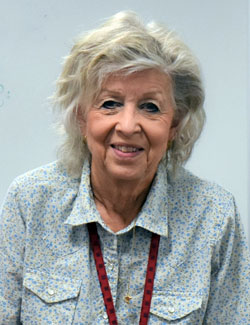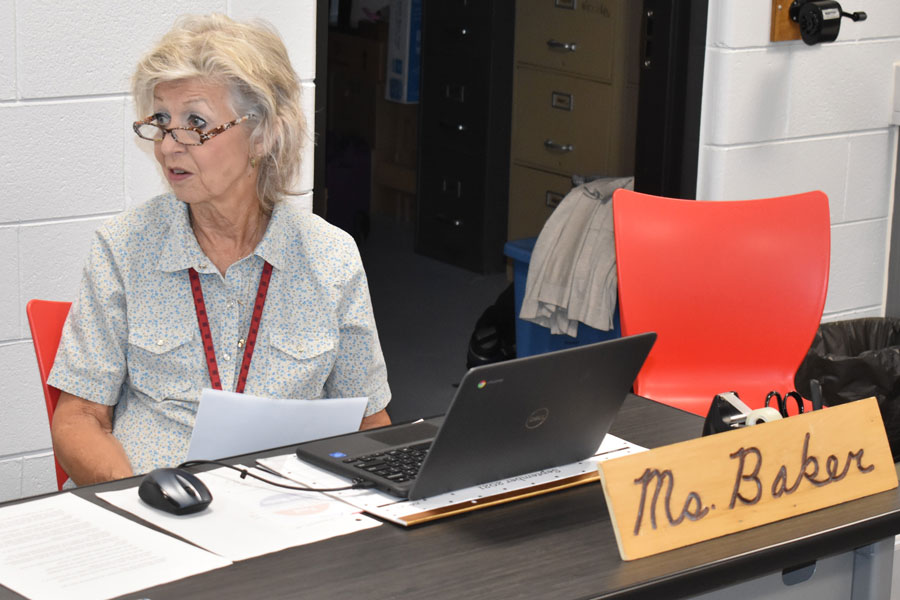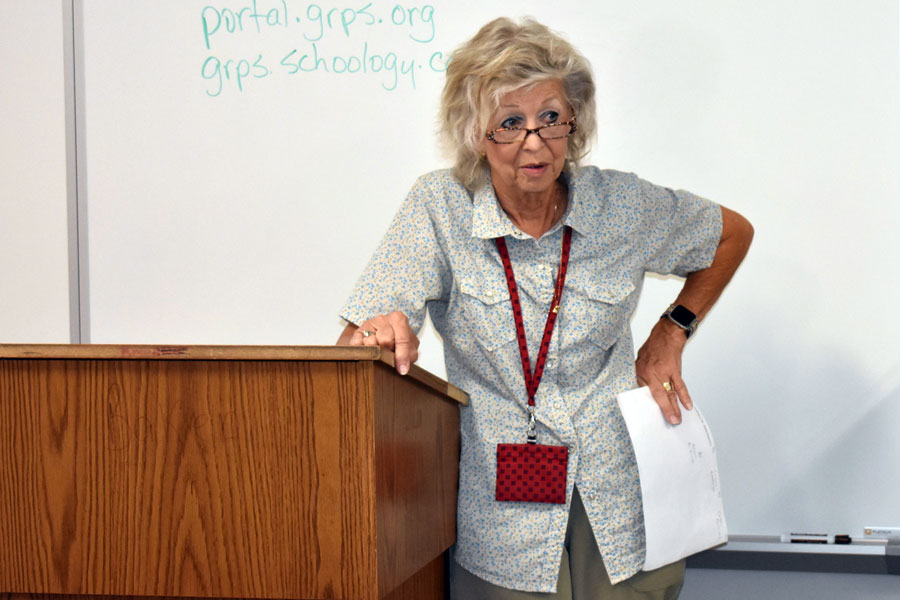Pat Baker thinks about retirement.
Sure.
There are mornings as she’s making the drive to Union High School when she wonders if this might be her last year in the classroom. She sees a couple of crossing guards during her commute and ponders leaving full-time teaching for a part-time gig helping the kiddos get safely to their destination.
Yet, at the end of a day teaching Swift’s “A Modest Proposal” or “Beowulf,” author unknown, or even Shakespeare’s enduring “Macbeth,” she thinks to herself that teaching is still pretty good. Her thoughts of retirement dissipate, and thoughts on becoming a crossing guard are put back on hold.
Still.
“Last year, I decided one more year if I didn’t have to do virtual,” she recently said with a chuckle in her English classroom at Union. “It’s 50 years now, and I think maybe ‘50 and I’m out’ seems about right.”
Yes, she said it’s been 50 years now.
“That’s why I keep thinking ‘Do I really want to give this up?’ When you get to see the light bulb come on, when they leave here and they know something they didn’t know when they came in, those are real positive moments, right.”
— 50-year veteran teacher Pat Baker
Pat Baker entered the teaching workforce in the fall of 1972 as a newly minted secondary education graduate of then-called Grand Valley State College, with a major in English and minor in history. She was one of only about 500 students to earn bachelor’s degrees that year from what was then a college of just over 4,000 students. She went on to earn a master’s in reading and statistics from Michigan State University, and did her coursework for a Ph.D. in literature at Michigan State and the University of North Carolina at Charlotte.
And she is now beginning her 50th straight year of teaching, all of them in Grand Rapids Public Schools.
She started at Central High School and was there 36 years. In 2008, she moved over to Union High School, where she had been part of the first graduating class from what was then a brand-new building in 1968.
And though she admitted she doesn’t navigate her classroom quite as quickly as she might have a decade or two ago, to watch her in action is to see a teacher who is still passionate about her subject matter and eager to convey that passion to her students, all of whom are young enough to be her grandchildren.
She also has adapted to many of the dizzying new technologies that mark the classrooms of the 21st century, including not just computers but also projectors and smart boards and learning management systems and much more.

‘Assertive and Attentive’
For her students, the adaptations she has made along the way in her career are great, but what stands out for them about Ms. Baker, as she is known, is much more than technology.
Union senior Jason Ike has Baker this year for the first time, and is nothing but smiles when asked about the veteran teacher.
“It’s been great so far,” he said. “She has a very charismatic way of getting her students’ attention. She is very strong, but everything she does is for the betterment of her students, and for that I respect her.”
Classmate Isaac Nhehema Wamujje agreed.
“What I like so far is the freedom and liberty to speak my mind,” he said. “Ms. Baker’s class feels like it’s run tight but enough room to have freedom, and Ms. Baker herself is assertive and attentive to the class but leaves room for ideas and potential for learning. I do enjoy her class, and English isn’t even my favorite school subject.”
‘A Modest Proposal’ As a Gateway to College Application Essays
In a recent class on “A Modest Proposal,” Baker stood in front of Jason, Isaac and a class of 30 other Union seniors and read from Swift’s satire in a clear, confident voice, even as she used the smart technology to highlight in yellow on the screen pertinent passages and clues for her students as to what they should be looking for in a group exercise to follow. They also would refer to them in subsequent classes and use some of Swift’s techniques to write their own college application essays.
Later, she spoke with a classroom guest about the Swift essay, which first was published almost 300 years ago, and how it connects to today’s students.
“About 15 years ago, I had a counselor come to me at Central and say, ‘These kids have to write these college essays, and they have no clue. So, is there any possibility you could teach them how to write a college essay?’”
Baker said she hit on Swift because of his use of emotional, logical and ethical appeals in his essay, all of which can and should be used, she said, as seniors apply to college and have to write essays of their own.
“Students can learn from Swift how to plan their response, state their claim and use certain appeals to make an impression on an admissions officer,” she said. “Swift’s essay has the additional benefit of being outragous enough to attract the attention of a teenager, so we can talk about why it is a good essay.”
The Worthwhile Moments
That’s why, after three classes digging into Swift’s methods, she spends another three classes having students craft an essay they can use as part of the Common Application. Better known simply as the Common App, it’s an application accepted at almost 1,000 colleges and universities around the U.S. and the world, and it includes seven essay prompts that students can respond to, which Baker covers in class.
“I like the fact that we have Google Docs now because they can save that (essay) to their Google Doc, and they can revisit that essay anytime they need an essay and make it work,” she said, eyes alight. She added with a beam on her face: “I had a girl who submitted her college essay that she wrote in my AP class to U of M and got a $60,000 scholarship based partially on that. So, it’s worthwhile. Yeah.”
Those worthwhile moments have kept her coming back for half a century, and, she admitted, might keep her coming back for a little while longer yet.
“That’s why I keep thinking ‘Do I really want to give this up?’ When you get to see the light bulb come on, when they leave here, and they know something they didn’t know when they came in, those are real positive moments, right.”
They Deserve Some Breaks
Baker said it’s interesting for her to ponder the arc of her career and consider the students she sees now and those she saw when she first started out.
“I think that today’s students are certainly a lot more keyed into technology phones,” she said. “Although I would say it’s phones more so than computers, because I think I’m as good on a computer or a laptop as they are those phones. Unfortunately, they’re a lot less inclined to read, to interact with a book. I don’t know as the behavior problems are any more significant now than they were back when I started.”
Indeed, Baker is quick to come to the defense of this generation of Union students. The grandchild of two Dutch immigrants, Baker said that history gives her an empathy for this next generation of immigrants.
“We have a pretty decent student population here,” she said. “I think a lot of these kids are very capable, very bright, they just lack the resources that other districts have. I like these kids, and I think that they deserve some breaks. We have a huge newcomer population here, and those are some pretty rewarding kids to work with. Some of them make a lot of progress in a short amount of time.”
Baker also has fond words for her colleagues and administration at Union, especially her fellow English teachers.
“We collaborate as an English staff quite a bit,” she said. “I think we work really well together.”

A Great Storyteller with a Historical Perspective
Her colleagues agree, and they speak with admiration about her abilities to teach and to connect.
Stephen Nisbet is a resource teacher at Union and pushes into Baker’s classes to support students who have Individualized Education Programs. He’s in his 21st year teaching in GRPS, including all of Baker’s 13 years at Union, usually two hours a day.
“She’s a great storyteller who gives kids a historical perspective that they wouldn’t get otherwise,” he noted. “She’s firm but kind, and always prepared. I think she is still the best teacher in the building after all this time because she is in charge and the students find that out very quickly, and students respect that. Underneath that no-nonsense demeanor is a heart of gold who would do anything for anyone. It’s been a blessing to work with her as closely as I have. I value her friendship very much.”
As Baker reflects on her career, she said she would tell the 1972 Pat Baker to not worry quite so much.
“You do not have to tell these kids every little finite detail,” she said. “There is usually a major point they have to get, and then there are some things that go with that major point, and if something falls through the cracks that’s not important, it’s OK. So that would be something else I would tell myself. Took me a long time to learn that, though, because I wanted them to know it all.”
Meanwhile, the Pat Baker now in her 50th year of teaching still loves what got her into education in the first place.
“I love being in the classroom, planning lessons that will engage and teach the students, and having class discussions,” she said. ”There is nothing like the interaction with students.”










